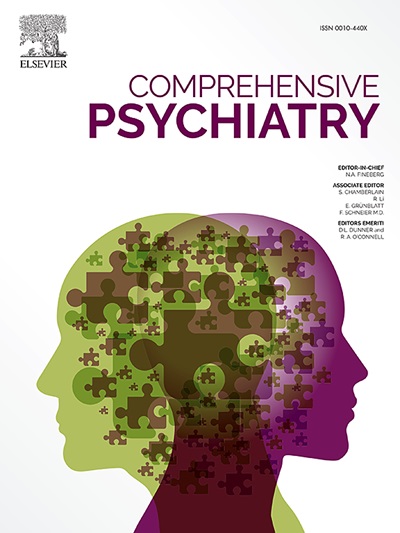单剂量(10mg)裸盖菇素可减轻成人强迫症的症状:一项药理挑战研究
IF 4.2
2区 医学
Q1 PSYCHIATRY
引用次数: 0
摘要
强迫症(OCD)是一种常见的致残疾病。很大一部分患者对血清素再摄取抑制剂(选择性血清素再摄取抑制剂(SSRIs)或氯丙咪嗪)的一线治疗无效。初步证据表明,裸盖菇素,一种血清素受体激动剂,可能是有效的。为了探讨裸盖菇素治疗强迫症的疗效及作用机制,我们进行了药理学挑战实验。本分析仅报告临床结果。方法诊断为强迫症(OCD)的至少中度严重程度的参与者,接受2次单剂量口服裸盖菇素,1 mg和10 mg,按固定顺序给药,间隔4周。在给药当天,他们在日间护理机构接受治疗,有使用致幻剂治疗精神障碍的临床医生在场。在给药前、给药期间和给药后提供心理支持。参与者和评分者不知道治疗顺序。他们在每次给药前一天(基线1、2)、给药当天和给药后4周的间隔时间内使用耶鲁-布朗强迫症量表(Y-BOCS)(主要临床结果)和次要临床结果包括蒙哥马利-Åsberg抑郁评定量表(MADRS)进行评估。不良反应也有记录。结果19名成年参与者(年龄在20-60岁)进入研究,其中18名完成了所有评估。采用线性混合效应模型和方差分析比较1mg和10mg裸盖菇素的临床结果。在Y-BOCS给药一周后,发现10mg裸盖菇素具有显著的剂量间效应(Cohen’s d = 0.82, p = 0.002)。特别是,在给药一周后,与强迫症(Cohen’s d: 0.50, p = 0.06)相比,强迫症在Y-BOCS强迫分量表上的效果具有统计学意义(Cohen’s d: 0.74, p = 0.003)。在随后的3周内,效果逐渐减弱。未检测到裸盖菇素对MADRS的影响。裸盖菇素耐受性良好,在两种剂量下几乎没有不良事件报告,没有严重的不良事件。结论:本研究受样本量小和缺乏随机化的限制,发现10mg口服裸盖菇素对强迫症患者耐受性良好且可能有效。裸盖菇素对强迫症状有快速起效,中等到较大的效果,在给药后持续长达一周。未来的随机安慰剂对照临床试验将研究更长疗程的每周多次剂量10mg裸盖菇素,用于强迫症和其他强迫症及以强迫症为特征的相关疾病。本文章由计算机程序翻译,如有差异,请以英文原文为准。
Single-dose (10 mg) psilocybin reduces symptoms in adults with obsessive-compulsive disorder: A pharmacological challenge study
Background
Obsessive-compulsive disorder (OCD) is a common and disabling condition. A large proportion of patients fail to respond to first-line treatment with serotonin reuptake inhibitors either selective serotonin reuptake inhibitors (SSRIs) or clomipramine. Preliminary evidence suggests psilocybin, a serotonin receptor agonist, might be efficacious. We conducted a pharmacological challenge study to investigate the efficacy and mechanisms of effect of psilocybin in OCD. This analysis reports the clinical outcomes only.
Methods
Participants with a diagnosis of OCD of at least moderate severity, received two single doses of oral psilocybin, 1 mg followed by 10 mg, administered in fixed order separated by 4 weeks. On the day of dosing, they were treated in a day-care facility in the presence of clinicians experienced in the use of psychedelics for treating mental disorders. Psychological support was provided before, during and after dosing. Participants and raters were blinded to the order of treatment. They were assessed on the day before each dose (baseline 1, 2), on the day of dosing and at intervals over a 4-week period afterward using the Yale-Brown Obsessive Compulsive Scale (Y-BOCS) (primary clinical outcome) and secondary clinical outcomes including the Montgomery-Åsberg Depression Rating Scale (MADRS). Adverse effects were also recorded.
Results
Nineteen adult participants (aged 20–60) entered the study and 18 completed all assessments. Clinical outcomes following 1 mg and 10 mg psilocybin were compared using a linear mixed-effects model and ANOVA. A significant between-dosage effect favouring 10 mg psilocybin was found one-week after dosing on the Y-BOCS (Cohen's d = 0.82, p = 0.002). In particular, the effect one-week after dosing was statistically significant on the compulsion subscale of the Y-BOCS (Cohen's d: 0.74, p = 0.003), compared to obsession (Cohen's d: 0.50, p = 0.06). The effect diminished over the subsequent 3 weeks. No effect of psilocybin was detected on the MADRS. Psilocybin was well tolerated, with few adverse events reported at both dosages and no serious adverse events.
Conclusions
In this study, which was limited by a small sample size and the absence of randomisation, a 10 mg dose of oral psilocybin was found to be well-tolerated and potentially efficacious in patients with OCD. Psilocybin produced a rapid-onset, moderate to large effect on compulsive symptoms, which lasted up to one week after dosing. Future randomised placebo-controlled clinical trials investigating a longer course of multiple weekly doses of 10 mg psilocybin are indicated in OCD and in other obsessive-compulsive and related disorders characterised by compulsions.
求助全文
通过发布文献求助,成功后即可免费获取论文全文。
去求助
来源期刊

Comprehensive psychiatry
医学-精神病学
CiteScore
12.50
自引率
1.40%
发文量
64
审稿时长
29 days
期刊介绍:
"Comprehensive Psychiatry" is an open access, peer-reviewed journal dedicated to the field of psychiatry and mental health. Its primary mission is to share the latest advancements in knowledge to enhance patient care and deepen the understanding of mental illnesses. The journal is supported by a diverse team of international editors and peer reviewers, ensuring the publication of high-quality research with a strong focus on clinical relevance and the implications for psychopathology.
"Comprehensive Psychiatry" encourages authors to present their research in an accessible manner, facilitating engagement with clinicians, policymakers, and the broader public. By embracing an open access policy, the journal aims to maximize the global impact of its content, making it readily available to a wide audience and fostering scientific collaboration and public awareness beyond the traditional academic community. This approach is designed to promote a more inclusive and informed dialogue on mental health, contributing to the overall progress in the field.
 求助内容:
求助内容: 应助结果提醒方式:
应助结果提醒方式:


